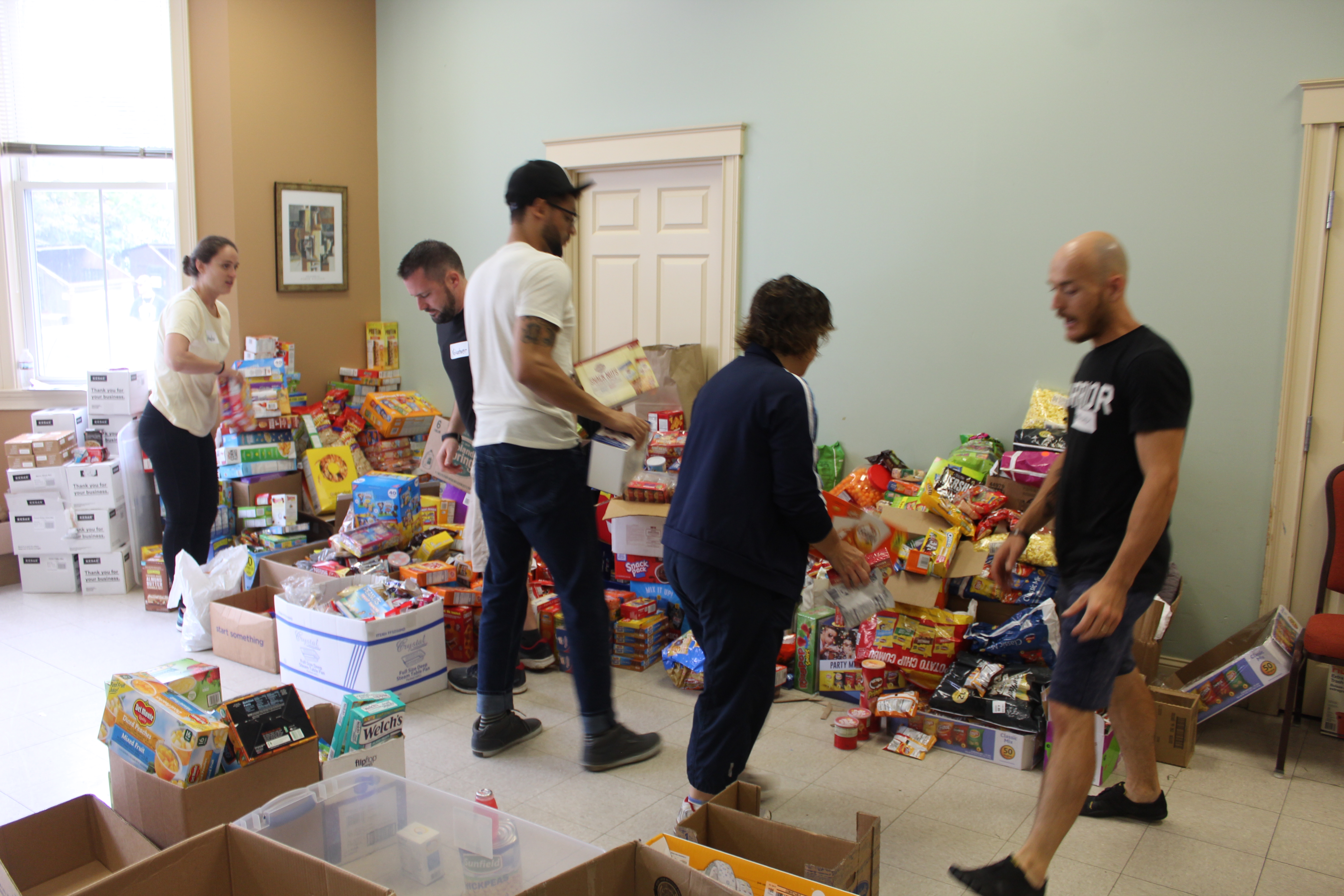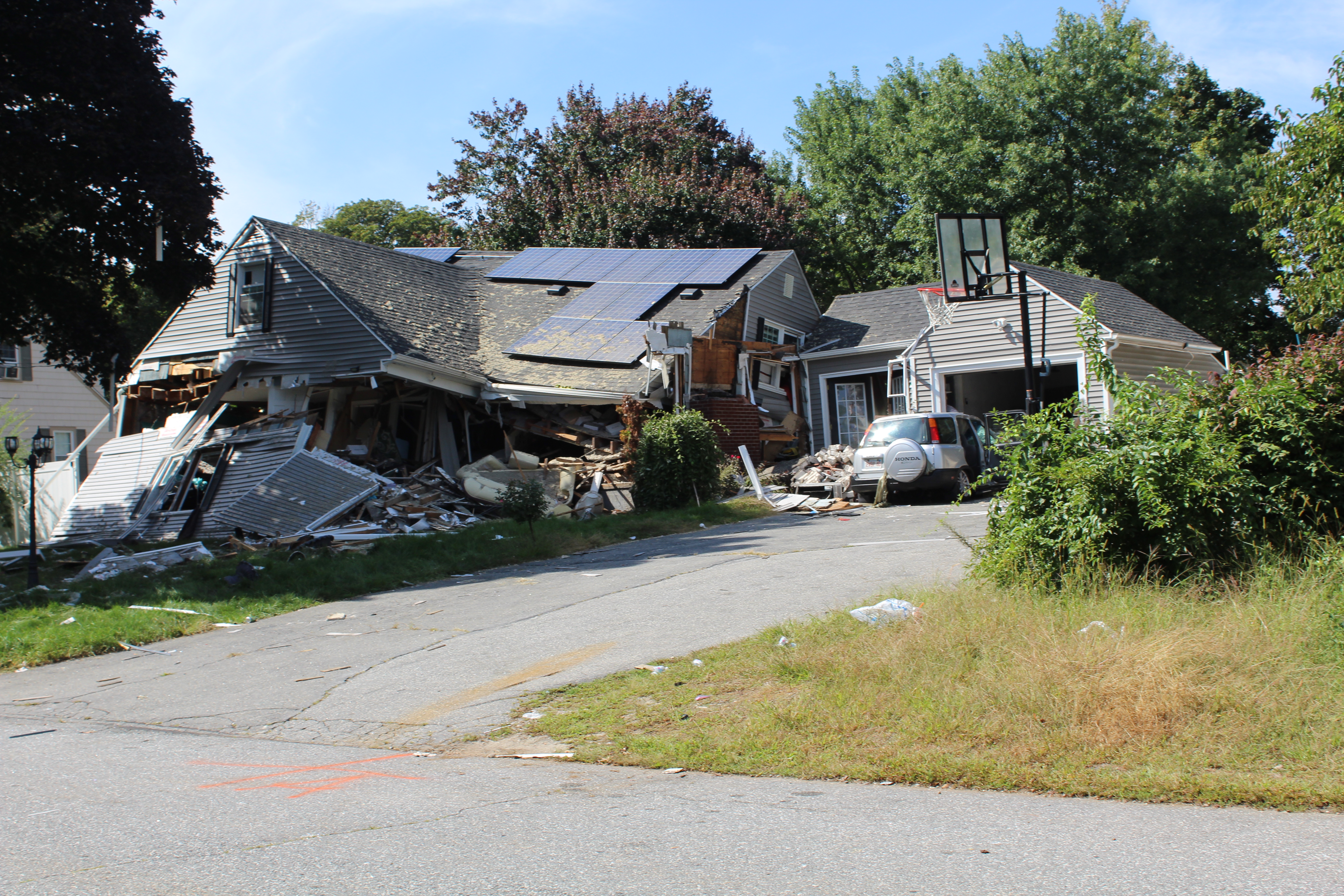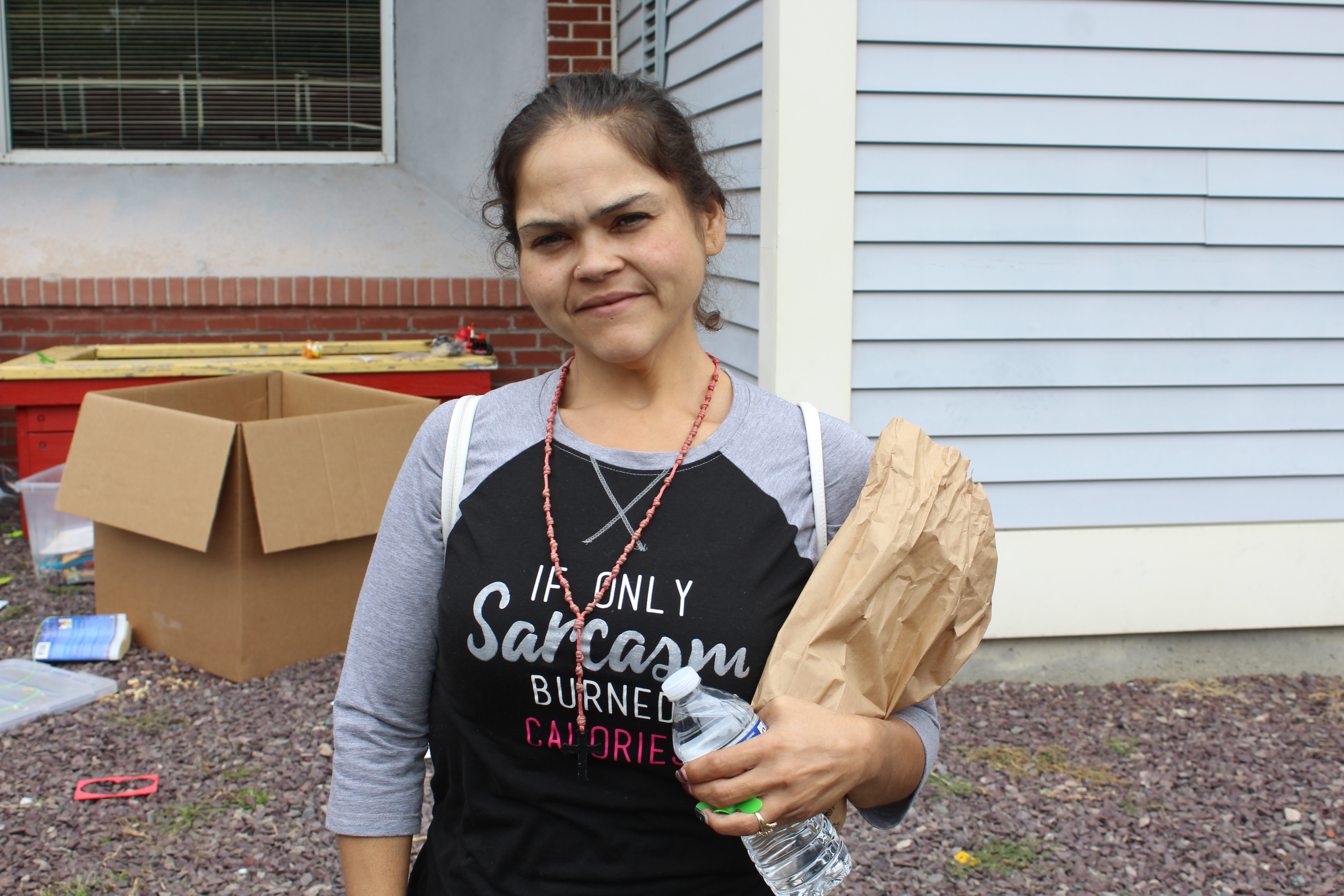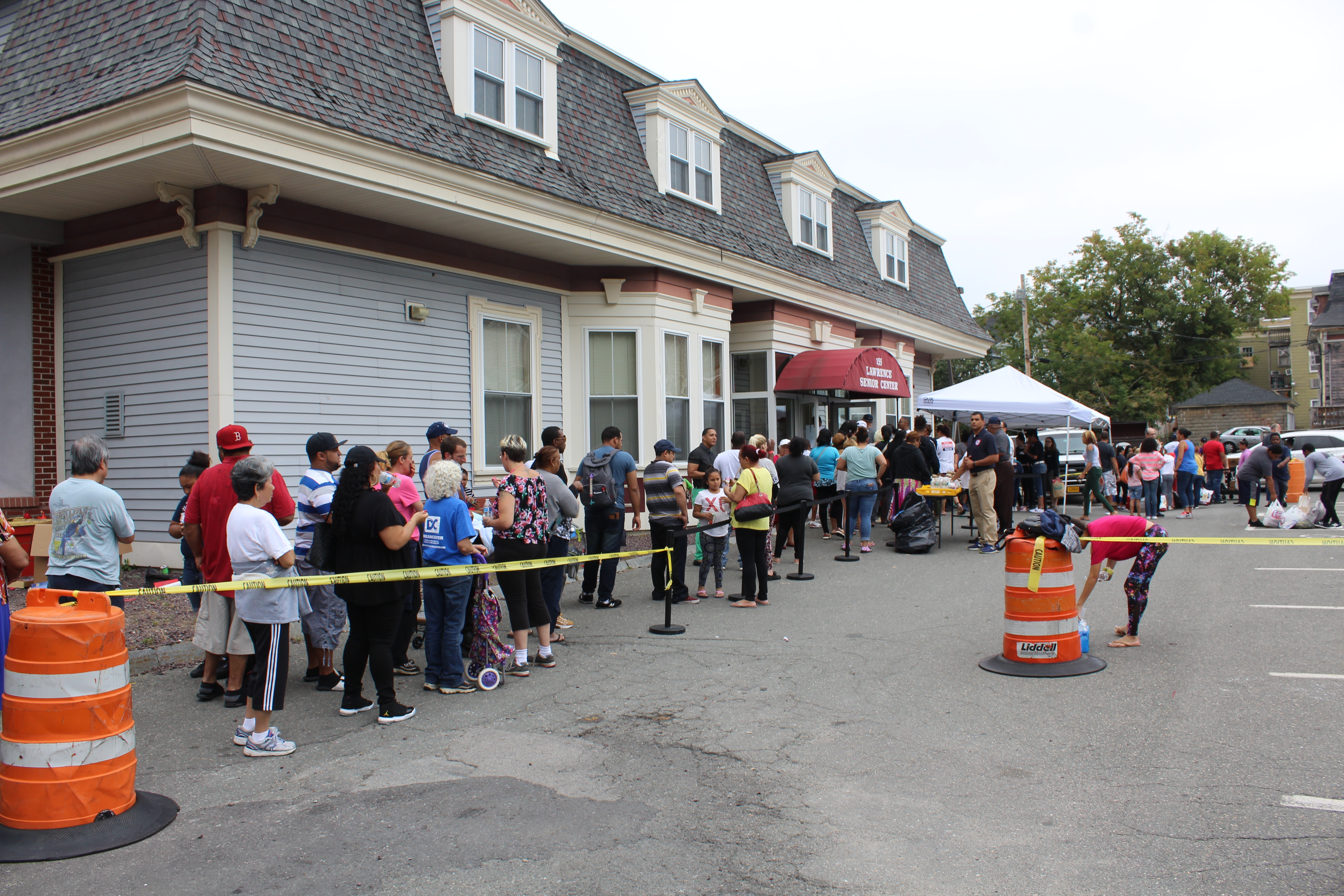The line outside the Lawrence Senior Center was dozens of people deep the Saturday after a series of gas leaks and fires displaced thousands of families in the Merrimack Valley. Photo: Alejandro Ramirez.
Intro: Thursday night evacuation
Around three in the afternoon on Thursday, Sept. 13, a detective at Yahaira Ramos’s home in the southern side of Lawrence, Mass. asked her to shut off her utilities. A half an hour later, the detective returned with the police and told the public housing tenant to leave.
“They told everybody to evacuate right away,” Ramos said.
Ramos rushed from her home near Lawrence High School. She could see fire from Springfield Street. She wasn’t the only resident fleeing home. The entire half of the city south of the Merrimack River was forced to evacuate and seek shelter elsewhere. The smell of gas was strong, and there was smoke in the sky.
“There was a commotion on South Union Street. All you could see was helicopters, firemen, police officers everywhere,” said Fran Fitzgerald, a resident of South Lawrence. “It felt like it was so close.”
Fitzgerald was heading home from her job as a school van driver, and just finished filling her vehicle with gas when an officer told her to get what she needed from home and get out of the area.
“If you’ve seen a warzone on TV, that’s what it looked like,” she said. “It was chaos, absolute chaos.”
“You could smell it,” she said, in reference to the gas. “The thing just burst and everything shook.”
Fitzpatrick gathered her husband, their pets — three cats and a dog — and headed to her in-laws’ home in Methuen.
An estimated 8,600 families were displaced in Lawrence, North Andover and Andover. They either stayed with family, holed up in hotel rooms, or sought refuge in Red Cross shelters.
Yahaira Ramos has a six year old daughter with cardiomyopathy and an asthmatic 12-year-old son. She and her husband took the kids to a hotel, worried how her daughter’s immune system would fare in a crowded shelter.
“She gets a simple cold, she’s in the hospital,” Ramos said. She said the first night in the hotel cost them over $300.
The fires and explosions injured 25 people and killed one young man: 18-year-old Leonel Rondon, who was visiting a friend’s house when it exploded. About 80 homes were affected by fires and there were three explosions, according to WBUR.
Families were able to return home as early as Sunday morning, but for many in the Merrimack Valley, the crisis isn’t over. Many homes are without gas as a chilly New England fall creeps in. A few families have yet to return home. And some citizens are still frustrated with Columbia Gas, the utility that over-pressurized the gas pipes within the Merrimack Valley, causing the leaks, explosions and fires.
Helping hands

Lawrence City Councilor Pavel Payano went to visit the Red Cross shelter set up at the Arlington Elementary School on Thursday night, around 8 p.m. He ended up volunteering most of the weekend.
“By the time I got there, there were probably a good 90 people there,” Payano said. He noticed they lacked volunteers to help sign-in people at the shelter and translate for Spanish speakers, so he helped assign volunteers.
“I kept staying in for longer and longer and longer,” Payano said. “I like felt I couldn’t leave.” The council says he and other volunteers didn’t leave until 3 a.m.
“Thank God we had an amazing group of volunteers that were willing to essentially assign themselves as leaders,” Payano said. “There were a lot of community folks that were running things.” For example, there were no showers at the Arlington shelter, so officials coordinated with the YMCA and other organizations to provide not only access to the facilities, but also transportation, towels, and toiletries.
“I’d get a volunteer and [they] would figure it out, how to get that done,” Payano said. They also set up a game room, brought in entertainment and set up movies in the cafeteria.
Payano said he identified at least 20 families at the Arlington shelter who couldn’t return home, and said Columbia Gas, the utility responsible for the series of fires, helped set them up in hotels.
A number of organizations stepped up to help in Lawrence. Fire departments and police departments throughout the region sent staff to help. Charitable organizations like the Salvation Army also lent assistance. The MSPCA in Methuen provided shelter for families with pets.
Lawrence organizations also joined the relief efforts. For example, Bread & Roses, a small soup kitchen that has operated in Lawrence for 40 years, helped gather donations and supplies. They were closing on Thursday night, wrapping up their dinner service, when the gas explosions started.
“I’ve never been in the thick of — ‘oh my God we have no gas, all our people are without gas or home.’ I’ve never been involved in that,” Susan Sirois said, executive director of Bread & Roses.
They are usually closed on Fridays, and while they opened their doors the day after the fires, most of their regulars didn’t stop by. They adjusted and checked the city’s website for what they needed most immediately — hygiene, medical supplies and diapers, for example.
Their Facebook page also helped provide updates and informative links. Sirois encouraged their usual volunteers to contact people on their street, and thinks going forward, helping people will be more strategic and targeted.
“It will be a very measured, specific response,” she said.
Sirois said that Bread & Roses workers are used to shifting priorities and tackling unexpected problems — if someone’s pet is missing, or they lose a friend to an overdose, “that becomes the emergency.”
“We’re all used to stopping what we’re doing because we’re in a human business,” she said.
Bread & Roses was actually affected by the gas leaks — it was one of the few locations in North Lawrence that was also affected by Thursday’s leaks. Sirois said many volunteers were affected, including the kitchen crew and a former board member. “I would say probably the greater majority of our folks were affected,” Sirois said.
The Lawrence Senior Center became one of the main hubs for donations in the city. The Saturday morning after the gas fires, dozens of people were lined up outside the door, and a few dozen more were inside, winding between 6 rows of tables full of supplies like food, diapers and paper towels.
Volunteers organized materials in three rooms, setting up crates of non-perishables, stacking mountains of paper and sanitary goods, and sorting clothes and towels. Cars and trucks full of donations snaked into the parking lot, backing up traffic on Haverhill St.
One of the volunteers was Marquis Victor, the executive director of Elevated Thought, an arts program for Lawrence youth. Marquis has volunteered time at the senior center and also organized a donation drive for the center. He also did a Target run to grab some clothes for one of the volunteers at the Senior Center, who left home with only the clothes on his back.
Victor spoke with Spare Change News before heading to the senior center and described the scene at Elevated Thought’s headquarters near the Lawrence canal.
That afternoon, there were about eight youths at Elevated Thought. Victor had heard some of the news when he arrived but didn’t realize the extent of the incident. A few of the youths were streaming the news on their computers, watching all the fires, hearing stories about explosions.
“People are calling family members because everybody has a family member down there,” said Victor. A few staff members, including the program director and the youth liaison, have families affected by the gas fires. About seven to 10 of the youth they work with were also affected and some knew people in South Lawrence who were displaced.
“It wasn’t even his crib. You wish that, out of all the craziness and all the displacement, that at the very least no one got killed. But a young man got killed.”
Returning home and recuperating costs

Officials lifted the evacuation order on south Lawrence at 7 a.m. Sunday morning, but some residents still had reservations about returning home.
Ramos returned home to gather some supplies, but a fire on Diamond Street — unrelated to the gas leaks, according to officials — worried her.
Fran Fitzgerald didn’t return home Sunday night.
“When you smell gas, that’s scary” she said.
When Fitzgerald finally returned home, she was relieved everything was still standing and undamaged.
When she opened the door, Fitzgerald said she “smelled fresh air… it smelled clean… It was good.”
On Monday, Fitzgerald visited her home while on her work break. She also went around the corner to 35 Chickering Road: the site of the weekend’s only fatality.
Crime scene tape roped off the ruins of 35 Chickering Road, as one police officer stood sentinel next to a yellow sedan. Rubble propped up the walls of the house, and the debris on the street stopped just short of the driveway across the way. The homes next door and across the street and around the block seem fine: single family homes standing, without even a scorch-mark. This house is the only one on the block that blew up.
Leonel Rondon had received his driver’s license the day before the fires. He drove over to his friend’s house at 35 Chickering Road and parked his SUV in the driveway. The house exploded, and its chimney fell onto the SUV while Rondon was still inside. He died in a Boston hospital. At least 25 more injuries were reported during the gas fires.
Fran Fitzgerald didn’t know Rondon or the family that lived there, but she still visited the site to give her respects.
“It’s a sad way to die. It’s just a sad way for something to happen,” she said.
The neighborhood was quiet that morning. A few passersby took pictures and chatted with the cop. The neighbors across the street lounged in their backyard, and down the street a mother herded her kids from their car to the house.
Fitzgerald said her husband was at the claims office
“They owe us a lot,” said Fran Fitzgerald. “We lost all our food, had to go buy clothes, medication.”
Footage from WCVB showed hundreds of Merrimack Valley residents in line at the claims office set up across the street from the Lawrence Public Library — the former Lawrence High School. By one in the afternoon, the line had disappeared, but families still entered and left the building at a consistent rate.
Residents were filing claims for lost food, property damage, lost wages, transportation costs and many other expenses.
Three employees from a South Lawrence Taco Bell visited the claims office hoping to claim lost wages.
Luis Jimenez was in line early in Monday morning, but received a blue ticket to go back the next day. Many of those in line with him had visited the office on Sunday, and told to return. Jimenez called the process a mess. “A lot of people are mad because they can’t get what they want right now,” he said.
May Tithkhied, 19, who also said her family wanted reimbursement for the food they lost, and electric burners they had to buy.
Payano noted many renters in south Lawrence will likely claim spoiled groceries.
“In this working class community, your biggest claim is small stuff. Food, transportation, and lost wages,” said Payano.
The city councilor also noted that it was possible for folks who lost food purchased via food stamps to apply for replacements.
What’s next

An estimated 8,600 residents were affected by the Merrimack Valley explosions and lost gas service. The National Transportation Safety Board investigation is predicted to take two years to figure out just what happened. For now, the main cause has been attributed to over-pressurized pipes. The disaster also highlighter how old the pipelines are: over 100 years old, according to the Eagle Tribune.
Officials and residents voiced frustration with Columbia Gas, especially after the utility’s apparent lack of response or action on Thursday night. Lawrence Mayor Dan Rivera initially blasted the utility for “hiding from the problem.”
Gov. Charlie baker declared a state of emergency and put rival utility Eversource in charge of operations.
Columbia Gas now plans to replace the 48 miles of pipelines and restore service by Nov. 19, but some experts and officials have expressed concerns over the accelerated timetable, noting this type of project usually takes months.
“To me, safety is priority, even if there are uncomfortable situations,” Lawrence City Council president Kendrys Vasquez told the Boston Globe. “There can be no cutting corners at this point.”
In the same article, Richard Kuprewicz, an adviser to the federal Pipeline and Hazardous Materials Safety Administration, warned “If they put too much emphasis on rushing, there could be some issues with quality-control checking and short-cutting.”
Pavel Payano echoed the concerns, but noted that the weather is already cooling off.
“You have folks that are sick and elderly that need warm showers. As the days go by, the temperatures gonna start getting colder,” he said. “For these folks, they need it quick. I don’t think anyone wants them to expedite things and not do it right.”
Mayor Rivera commended them for their work over the weekend and thanked the company for a $10 million contribution to the Greater Lawrence Disaster Relief Fund. However, Rivera also told the Boston Globe he’ll hold the company accountable should they miss the November 19 deadline.
Responding to concerns tax payers could foot the bill for restoration efforts in the Merrimack Valley, Governor Baker said, “The bottom line is Columbia is going to pay for it.”
The National Guard distributed thousands of hot plates the week after the gas leaks and also installed space heaters to keep residents warm as the cold weather sets in.
Obviously, Merrimack Valley residents are frustrated with the gas company, especially their noticeable absence on Thursday night.
“When Columbia Gas wouldn’t come out and talk, I was so pissed. They’re hiding? People are dying and they’re hiding?” Fitzgerald said.
“The lack of communication, the lack of taking ownership doesn’t leave me any confidence,” said David Bickle, a North Andover homeowner who visited the Columbia Gas claims office in Lawrence. “I have no trust in this company’s ability to say that the system is safe and this won’t happen again.”
According to WBUR, Columbia Gas agreed to pay for all claims “related to bodily injury, property damage, disruption of business and other inconveniences caused by loss of gas service” in a statement released by Another officials. Officials also said Columbia Gas would compensate residents who convert to oil or electric.
Local news outlets have also drudged up the utility’s past indiscretions.
WGBH reports that Columbia Gas and other subsidies owned by its parent company, NiSource, have a history of filing incident late reports. On average, the utilities took over 500 hours to report incidents to the National Response Center — well past the 12 hour deadline.
NiSource has also been linked to three other explosions in the last six years, including one in Springfield, MA.
The incidents raise concerns about the safety of using gas and fossil fuels. Nathan Phillips, an Earth & Environmental professor at Boston University, says similar pipeline bursts could happen anywhere, despite a “low probability, high impact” risk profile. Geoff Koetsch of the Mass Sierra Club’s Merrimack Valley Action Team told Spare Change News that while efforts to modernize gas pipelines may improve safety, they also seemed design to “increase a dependence on fossil fuels … and increase profits.”
Prior to the explosions, Columbia Gas planned to increase costs by $33 million on November 1. That plan is currently on hold.
Conclusion: More sides to Lawrence

Back in March, President Donald Trump spoke in New Hampshire and accused Lawrence, a sanctuary city, to be a safe haven for violent gang members. He also cited a Dartmouth study that said most fentanyl in New Hampshire could be traced back to Lawrence. Attorney General Jeff Sessions repeated these claims in July, which prompted Lawrence mayor Dan Rivera to announce he was considering suing the justice department for libel.
Trump’s words reflected a regional stigma. In 2012, a Boston Magazine feature labeled Lawrence the “City of the Damned,” and in 2017, New Hampshire governor Chris Sununu blamed Lawrence for his state’s opioid crisis.
“There’s so many hardworking, genuine people that put their nose down and do what they need to do to provide for their family,” Victor said. “The external narrative of Lawrence doesn’t zoom in and see that. Lawrence is always drugs, the violence, shit like this that always happens . . . All these things that Lawrence gets bad media for completely undermines the overwhelming amount of good things that happen in this city.”
“We’ve got good people who live here as well and they’re putting a label on everybody. And that’s not right,” said Ramos. “There’s professional people here, there are people suffering, there are people that have a hard life like we do… That’s not right, putting us down like that. I am part of Lawrence. That affects me directly.”
“The Lawrence community kinda seems to look at officials like they look down on us — we kinda get the last of what we should get,” said Jimenez, connecting the frustration at the Columbia Gas claims center to the city’s longstanding struggles.
While the gas leaks also affected Andover and North Andover, two-thirds of those affected by the outages live in Lawrence, according to the Boston Globe. . The incident is also notable given the city’s ethnic and economic makeup: it’s a Latino-majority city with lower-income than the neighboring Andovers.
As of 2010, the city qualified as an Environmental Justice population, a term that refers to communities with lower incomes than the statewide average, a significant population of color, and notable amount of households that don’t speak English. Such communities are at greater risk for pollution and the effects of climate change.
“It’s the nature of human history, especially in urban areas,” Victor said. “Shit always happens to poor people.”
Still, many see the gas leak emergency as a chance to show outsiders another side of Lawrence, one largely ignored by local officials and press.
“Throughout what happened, you saw a community really come together and be united in helping their neighbors out,” Payano said. “And then you saw the general public support those efforts. We had donations come in from Maine, Rhode Island, all the way through western Mass.”
“I’m hoping that through this tragedy that happened, more light gets shone on the community that’s helping each other, that’s supporting, that’s loving one another,” said Victor.

Leave a Reply
You must be logged in to post a comment.